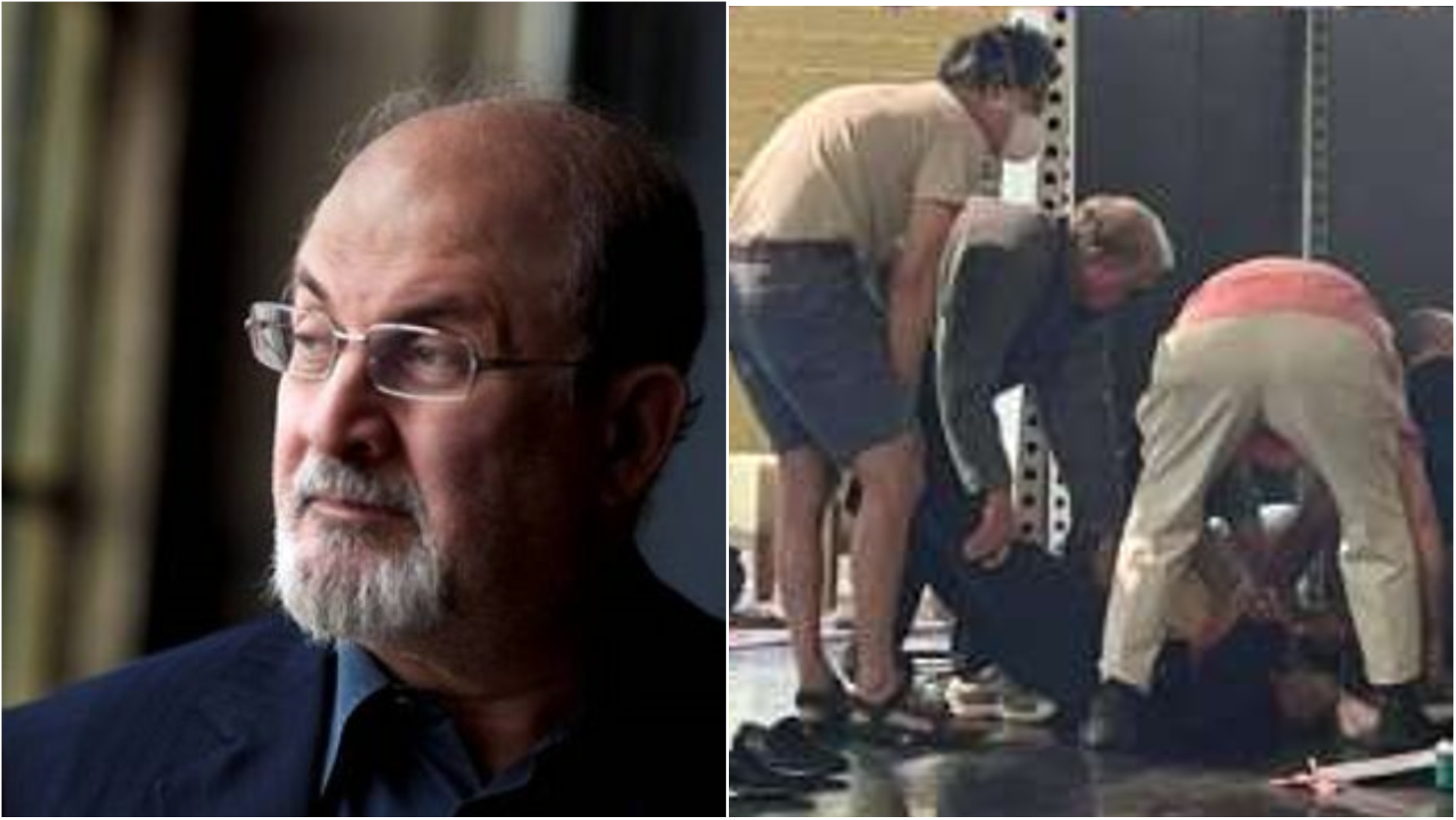Hours after renowned author Salman Rushdie was stabbed indiscriminately at an event in New York, he was put on ventilator with a damaged liver, severed nerves in an arm and an eye he was likely to lose. His fourth novel “The Satanic Verses” was at the centre of controversies and drew death threats from Iran’s leader in the 1980s. On Friday, his assailant who rushed the stage he was about to give a lecture at the Chautauqua Institution, leaving Rushdie bloodied.
The 75-year-old award-winning author was flown to a hospital and underwent surgery. So far, doctors believe that he is critical but “recoverable”.
The police identified the attacker as Hadi Matar, 24, of Fairview, New Jersey. He was arrested at the scene and was awaiting arraignment. State police Maj. Eugene Staniszewski said the motive for the stabbing was unclear.
World Left Aghast
Eyewitnesses recounted the ghastly sequence events when the attacker confronted Rushdie on stage at the Chautauqua Institution and stabbed him 10 to 15 times as he was being introduced.
Event moderator Henry Reese, 73, a co-founder of an organization that offers residencies to writers facing persecution, was also attacked. Reese suffered a facial injury and was treated and released from a hospital, police said. He and Rushdie were due to discuss the United States as a refuge for writers and other artists in exile.
A state trooper and a county sheriff’s deputy were assigned to Rushdie’s lecture, and state police said the trooper made the arrest. But after the attack, some longtime visitors to the center questioned why there wasn’t tighter security for the event, given the decades of threats against Rushdie and a bounty on his head offering more than $3 million for anyone who kills him.
The Associated Press quoted Rabbi Charles Savenor, who was among the roughly 2,500 people in the audience. Amid gasps, spectators were ushered out of the outdoor amphitheater.
The assailant ran onto the platform “and started pounding on Mr. Rushdie. At first you’re like, ‘What’s going on?’ And then it became abundantly clear in a few seconds that he was being beaten,” Savenor said. He said the attack lasted about 20 seconds.
Another spectator, Kathleen James, said the attacker was dressed in black, with a black mask.
“We thought perhaps it was part of a stunt to show that there’s still a lot of controversy around this author. But it became evident in a few seconds” that it wasn’t, she said. Matar, like other visitors, had obtained a pass to enter the institution’s 750-acre grounds, President Michael Hill said.
The suspect’s attorney, public defender Nathaniel Barone, said he was still gathering information and declined to comment. Matar’s home was blocked off by authorities.
Rushdie has been a prominent spokesman for free expression and liberal causes, and the literary world recoiled at what novelist and Rushdie friend Ian McEwan described as “an assault on freedom of thought and speech.”
“Salman has been an inspirational defender of persecuted writers and journalists across the world,” McEwan said in a statement. “He is a fiery and generous spirit, a man of immense talent and courage and he will not be deterred.”
Controversy around Salman Rushdie’s ‘Satanic Verses’
The book was banned in Iran, where the late leader Grand Ayatollah Ruhollah Khomeini issued a 1989 fatwa, or edict, calling for Rushdie’s death. Khomeini died that same year.Iran’s current Supreme Leader Ayatollah Ali Khamenei has never issued a fatwa of his own withdrawing the edict, though Iran in recent years hasn’t focused on the writer.
Iran’s mission to the United Nations did not immediately respond to a request for comment on Friday’s attack, which led a night news bulletin on Iranian state television.
The death threats and bounty led Rushdie to go into hiding under a British government protection program, which included a round-the-clock armed guard. Rushdie emerged after nine years of seclusion and cautiously resumed more public appearances, maintaining his outspoken criticism of religious extremism overall. He said in a 2012 talk in New York that terrorism is really the art of fear.
Anti-Rushdie sentiment has lingered long after Khomeini’s decree. The Index on Censorship, an organization promoting free expression, said money was raised to boost the reward for his killing as recently as 2016.
In 2012, Rushdie published a memoir, “Joseph Anton,” about the fatwa. The title came from the pseudonym Rushdie had used while in hiding.Rushdie rose to prominence with his Booker Prize-winning 1981 novel “Midnight’s Children,” but his name became known around the world after “The Satanic Verses.”
Widely regarded as one of Britain’s finest living writers, Rushdie was knighted by Queen Elizabeth II in 2008 and earlier this year was made a member of the Order of the Companions of Honor, a royal accolade for people who have made a major contribution to the arts, science or public life.
In a tweet, British Prime Minister Boris Johnson deplored that Rushdie was attacked “while exercising a right we should never cease to defend.”
(With inputs from agencies)





